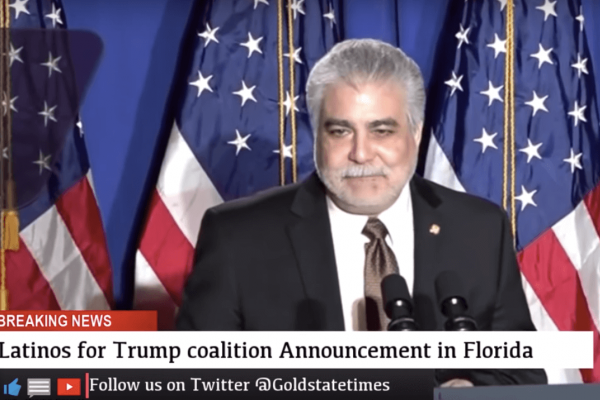While the relationship between white evangelicals and President Trump is clear— they’ve consistently held a highly favorable view of him — the relationship between Latino evangelicals, Trump, and the GOP is tense but far from tenuous.
Latino evangelical leaders are playing an outsized role in the politics and outreach of the Trump administration even though Latino evangelicals comprise less than a fifth of the Latino population. Evangelical leaders’ ardent support of the president can put them at odds with their congregations.
Nevertheless, some Latino evangelical leaders and the Trump administration have forged ahead in their mutual support. The 2020 Latinos for Trump organization, which is officially tied to the reelection campaign, prominently features three Latino evangelical pastors with long ties to Trump: Mario Bramnick, Pasqual Urrabazo, and Ramiro Peña.
Bramnick and Peña were members of the 2016 National Hispanic Advisory Council and Peña also served on Trump’s Evangelical Advisory Board. Bramnick and Urrabazo are part of the Latino Coalition for Israel, while Peña is the head pastor at Christ the King Church in Waco, Texas. Someone who has advised Trump but is not listed in the official 2020 Latinos for Trump group is Samuel Rodriguez, president of the National Hispanic Christian Leadership Conference, which Urrabazo and Bramnick are also associated with.
Who are Latino evangelicals?
Latino evangelicals are a growing group, that trend younger than white mainline and evangelical Protestants. Over half of Latino evangelical households earn less than $30,000 a year. Women make up the majority of this group: about 6 out 10 Latino evangelicals are women. Latino evangelicals are very devout, compared to the general Latino and U.S. populations.
Latino evangelicals are not starkly partisan, but they are politically contradictory. For example, 64 percent of Latino evangelicals say that abortion should be illegal in all or most cases and 60 percent oppose same-sex marriage. However, only 31 percent are Republican or Republican-leaning. Nearly 60 percent of Latino evangelicals favor a bigger government and more services and 50 percent believe that government aid to the poor does more good than harm. Yet, only 22 percent identify their political ideology as liberal, while 39 percent identify as conservative. Underlining this chasm between the intersection of faith and politics, 67 percent of Latino Protestants view Trump unfavorably overall.
Evangélicas/os not Evangelicals
The differences between white and Latino evangelicals have led the religious scholars Loida I. Martell-Otero, Zaida Maldonado Pérez, and Elizabeth Conde-Frazier, to make a distinction between white evangelicals and Latina/o evangélicos. While in the U.S., evangelicals are associated with a set of conservative social stances and the Republican party, those same ideas and worldviews don’t adhere to evangelicos. While they share a belief in the Bible as the word of God, a “born-again” experience, and a desire to transform the world around them, evangélicos demographic differences and lived experiences inform their distinct social, political, and theological world views.
Perhaps the most obvious difference that Martell-Otero, Maldonado Pérez, and Conde-Frazier point out is that the majority of evangélicas/os are women. Evangélicas shape the theological understandings and praxes because of their outsized presence in congregations, communities, and homes. The focus of evangélicas on the Spirit and God’s presence in the quotidian aspects of their lives is a way they understand the divine in order to deal with the dehumanization that they as women, as immigrants, and as poor people face daily.
Women, especially, are a driving force in these churches and communities, yet the national Latino evangelical leaders who support Trump are nearly all men who articulate a different set of political and theological values.
The national spokesmen
Samuel Rodriguez, perhaps better than others, represents the contradictory positions of Latino evangelicals that juxtapose social conservatism and liberal policy. In a 2008 essay for Reflections, Rodriguez described how Latinos were not only changing the demographic landscape but also the political and theological terrain of the nation. “Brown Christians … are poised to redraw the moral map with a commitment to [sanctity of life and marriage and socioeconomic equality], working within a framework of righteousness and justice,” he wrote.
Rodriguez created the National Hispanic Christian Leadership Conference. The NHCLC works to empower Latino evangelicals, encourage their appointment in key social and political roles, change the image of evangelicals as “angry” and reactionary, and influence society. While those goals coincide with other progressive Latino organizations, the NHCLC also fights against “moral relativism, spiritual apathy, [and] cultural decadence,” while “simultaneously elevating biblical marriage, championing life and protecting religious liberty.”
On Rodriguez’s TBN show PRAISE, he hosted a conservation on “race and grace,” where he and a group of pastors were going to solve the issue of racism. They said that the answer is not political. Rodriguez explains, “we have to stop depending on political solutions when the church has a prophetic antidote in the name of Jesus. So if you have your hopes on the donkey or the elephant, good luck with that. My hope is in the Lamb.”
Rodriguez offered that racism and prejudice is a personal sin, a product of an unrepentant heart. The solution was a personal change of heart facilitated by god. “We want to see the ending of racism in this generation by faith,” Rodriguez declared. For Rodriguez, racism is not a hate problem, it’s a heart problem and only the Lord can change hearts.
Latino evangelical leaders most closely associated with Trump also promote a transnational dominionism across the Americas. Instead of a separation between church and state, they believe that Christians should control the levers of the state. They believe this eventual Christian political ascendancy to be God’s will.
When Pastor Peña kicked off the Latinos for Trump event in June of 2019 with the invocation, he exhibited a soft dominionism that traffics in the notion that Christians have lost control over society and culture.
He prayed, “give us leaders, lord, who will honor you, worship you, and reverently fear you … we declare that no weapon formed against our president and vice president or their families will prosper. And may we as a nation forever stand in agreement with our president when he declares: he in America we worship God not government.”
In interviews, Peña has described Latinos as “very pro-life, pro-faith, pro-traditional values,” adding that the Trump’s policies and his “ heart of compassion” have helped create a more Christian nation.
More explicitly connected to dominionism, the Latino Coalition for Israel (LCI), has made links with some of the most conservative presidents of Latin America nations with strong ties to Trump, like Nayib Bukele of El Salvador and Jair Bolsonaro of Brazil.
In the news articles the LCI produce and share, they describe the divine will that Bukele and Bolsonaro represented. Both were evangelicals that God called upon to make their nations and the world better. In describing Bukele’s political ascendancy, the LCI described him as a businessman with no interest in politics. But then, God called on him to run. Four different groups of pastors came to Bukele, telling them that God had told him he should run. In at meeting where LCI members were present, Bukele told the group, “It’s important to put government in the hands of God. Pray for wisdom and run government God’s way.”
LCI described Bolsonaro positively as a Brazilian Trump, even though he has made various violently homophobic statements and has connections to the military dictatorship that used to govern Brazil. They connect his ascendancy to the will of God, represented by the fact that evangelicals voted for him in large numbers, just like Trump. Bramnick, the president of LCI, prayed over Bolsonaro. Bramnick believed that Secretary of Human Rights, Damares Alvares who has conservative stances and is connected to the evangelical church, would “do an amazing work as secretary, fighting for human rights and religious freedom in Brazil and abroad.”
A difficult position
The politics and experiences of Latino evangelicals place them and their national leaders in a difficult position. The rhetoric and policies of the Trump administration directly threatens Latino evangelicals, who are overwhelmingly young, poor, immigrants. The blanket statements from Trump that portray brown bodies as inherently criminal and an invading force, runs counter to the ways that large swaths of them understand themselves as humans and Christians.
For many Latino evangelicals, their faith is the very way they challenge their dehumanization. Their belief that they are beloved children of God challenges their marginalization and demonization. However, key leaders — like Rodriguez, Peña, Urrabazo, and Bromnick — support Trump and increasingly support authoritarian leaders in Latin America with evangelical ties. They believe that these politicians are doing God’s work, even while they attack the most vulnerable of God’s people.
Got something to say about what you're reading? We value your feedback!





